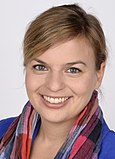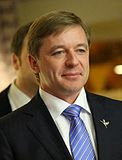2019 Weranian federal election
| |||||||||||||||||||||||||||||||||||||||||||||||||||||||||||||||||||||||||||||||||
All 545 seats to the Volkstag 273 seats are needed for a majority in the Volkstag | |||||||||||||||||||||||||||||||||||||||||||||||||||||||||||||||||||||||||||||||||
|---|---|---|---|---|---|---|---|---|---|---|---|---|---|---|---|---|---|---|---|---|---|---|---|---|---|---|---|---|---|---|---|---|---|---|---|---|---|---|---|---|---|---|---|---|---|---|---|---|---|---|---|---|---|---|---|---|---|---|---|---|---|---|---|---|---|---|---|---|---|---|---|---|---|---|---|---|---|---|---|---|---|
| |||||||||||||||||||||||||||||||||||||||||||||||||||||||||||||||||||||||||||||||||
| |||||||||||||||||||||||||||||||||||||||||||||||||||||||||||||||||||||||||||||||||
General elections will be held in the Lands of the Weranic Crown for the Volkstag (the lower house of the Reichstag) on the 22nd May 2019. All 545 members of the Volkstag will be elected under a supplementary voting system with 300 of its members are elected via a two-round system in single-member electoral districts and 245 via partly-list proportional representation with seat allocation being formulated via the d'Hondt method.
Electoral process
Werania has since 1944 used an supplementary voting system with a 3% electoral threshold. 300 members of parliament are elected in single-member districts using a two-round system whilst 245 are elected using regional party-list proportional representation closed lists. Seat calculation is conducted via the d'Hondt method despite there being no overhang seats mechanism. If parties win under 10 district seats but do not pass the 3% threshold they are not entitled to list seats. Seat distribution is based on the results from the party list vote rather than the district seats vote.
Voter eligibility
Timetable
Background
In the 2015 general election the "purple" government of the centre-right Modern Centre Party and centre-left Cooperative Party under Chancellor Dietrich Wittmann was re-elected with a reduced share of seats with the opposition National Consolidation Party getting the worst result in its history. Since being re-elected the purple government has seen its popularity reduce due to austerity measures and the election of new opposition leader Oskar Lautenbach but remains broadly popular.
In 2018 Wittmann resigned as Chancellor due to intractable differences between himself and the leader of the KOP Viktor Oberhauser. The Modern Centre party subsequently elected former Euclean Community commissar Otto von Hößlin as PMZ leader and Chancellor, maintaining the coalition.
Parties
- The Modern Centre Party (Partei des Modernen Zentrums) and Sotirian Democratic Homeland who run on a joint electoral list is the largest caucus in the lower chamber with 167 seats and the senior party in government with 7 members of the Cabinet including Chancellor Otto von Hößlin being members of PMZ. Both liberal conservative and Sotirian democratic parties the PMZ and the SDT are considered a strong supporter of the EC and primarily gets support from the protestant community in Werania. Since winning in 2015 it has declined in polls behind the opposition NKP.
- The Cooperative Party (Kooperative Partei) is the third largest party with 115 seats, being the junior partner in the current coalition government with 7 members serving as members of the cabinet with leader Viktor Oberhauser serving as Vice-Chancellor. A social democratic party, the KOP is mainly supported by working class and young people's with support from both the Catholic and Reform communities. The KOP has held consistent support since the 2015 election.
- The National Consolidation Party (Nationale Konsolidierungspartei) is the largest opposition party with 36 seats in the Volkstag. A Sotirian democratic party after facing its worst defeat in the 2015 election the NKP elected Oskar Lautenbach as their new leader. A right-wing populist Lautenbach has shifted the party to the right supporting national conservatism, anti-immigration sentiment and hard-Euclescepticism. Since the election of Lautenbach as leader the NKP has risen in the polls.








